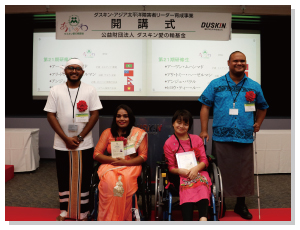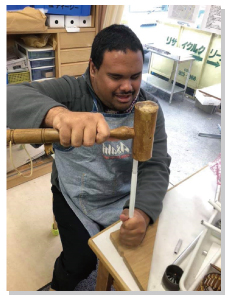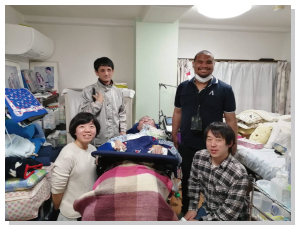Final Report
Ari's Final Report
My Life-Changing Duskin Journey in Japan
Introduction:
Talofa everyone!
I come from Samoa, a beautiful country located in the South Pacific. My hobbies include learning different languages and cultures, using Facebook as an advocacy tool, meeting new people, networking with new people and building new partnerships. As this was the first time a trainee was selected from Samoa, I am very honored to have been able to attend this life-changing training program for persons with disabilities.
I represent Samoa’s national disability rights advocacy organization and an organization for the visually impaired. I firmly believe that the knowledge, skills and experiences I gained from this training are highly relevant to the work of my disabled people’s organizations in Samoa, as well as for me as a young blind individual.

Japanese Language and Japanese Braille Classes
For the first 3 months in Japan, we were given a wonderful opportunity to learn basic Japanese. These Japanese classes were important because they equipped us with basic Japanese skills to communicate with Japanese people and helped us build unforgettable friendships, networks and potential partnerships. These classes were also personally important for me, a blind person, because they enabled me to communicate with Japanese people, ask them for the help I needed for my daily life in Japan, and so forth. I was also extremely grateful to be able to learn Japanese because it helped me have a better understanding of the Japanese mindset and why and how different disability organizations in Japan carried out their respective services and promote different ideas to improve the lives of persons with disabilities.
I am also so thankful to have had the chance to learn Japanese Braille because it has helped me appreciate this amazing and living written language more than ever. I will do my best to promote the use of Braille in Samoa.
It is amazing to see how Braille is present almost everywhere in Japan’s public spaces, including on vending machines, signboards and railway station signs. I hope to use my Japanese language skills and communicate with Japanese people and tourists living in, working in and visiting Samoa and hopefully partner with Japanese aid agencies in Samoa and the Pacific region.
During the training, we also had a chance to participate in group training which helped us learn more about people with various disabilities, different from our own. It was extremely useful because it equipped us with more knowledge and skills to conduct and establish cross-disability initiatives and partnerships, especially in national advocacy work which requires cross-disability approach.
During the group training, we also had a chance to visit some universities. They had support centers for students with disabilities. The centers interacted and networked with students without disabilities. We learned so much from this group training, and it also brought the four of us closer as we helped one another, learning to work as a team, manage schedule, and how to take responsibility for each day of the group training, all of which were very useful lifelong skills.
Individual Training
I was sent to various organizations across Japan to learn important skills to support blind and visually impaired people. I learned about different types of employment for blind and visually impaired people, as well as services of the WITH organization. At WITH’s workshop, I learned to make a white cane, which was difficult at first but I somehow managed it. I also learned other practical skills. I also had a chance to play blind soccer, visit a school for the blind, attend a capacity building workshop and interact and network with people.

I was also sent to the Japan Braille Library where I participated in a radio interview, an awareness program, learned about the library’s different services especially how to create and distribute Braille, which will be very useful in Samoa as our association also produces materials in Braille. I was also introduced to the DAISY format, enjoyed the tactile museum and learned about the founder of the library and its history. This experience was actually personally special to me as I was a former trainee of the Teruko Ikeda ICT training program and electronic Braille training in 2013, in Malaysia and Samoa, courtesy of the Japan Braille Library. This time I attended an orientation and mobility training to learn how to walk along tactile or Braille paving tiles and travel by train by myself, which was such a life-changing experience.
I also visited an organization called UNI where I learned about its inclusive education services and personal assistant services for persons with severe disabilities. I also had a chance to participate in an intense three-day training for helpers for the blind, especially those who have lost their sight in old age. The training was enjoyable, and unforgettable. I also had a chance to participate in an accessibility audit of a tourist site in Kyoto. I also visited a university that provided accessible documents to blind students. I also met young and blind and visually impaired students/working professionals. I learned so much from them as we shared our life experiences and networked unofficially over food and drinks, which is a process called Tabenication (communicating through food) and Nomunication (communicating through drinks) in Japanese.

I also visited the Nippon Lighthouse where I learned more about Sapie, an online digital library which houses many Braille and DAISY books and audio films. I also had a chance to try out products on the service floor, learn about audio guides, and walk with a guide dog for the first time. I also visited other small organizations in Osaka who provide support for the blind as part of the services of, or in partnership with, the Osaka Lighthouse. I was also given a chance to stay at the home of Mr. and Mrs. Takeshita and learned about their life. It was encouraging. I also visited important historical sites in Osaka and enjoyed every moment.
During the Covid-19 state of emergency from April to June, I was evacuated to the International Association for The Visually Impaired (IAVI), where I learned about the scholarship that the organization sponsored for young blind people in Asia and Africa to help them learn massage, acupuncture and moxibustion skills. At IAVI I met some lifelong friends. I hope that someday a representative from Samoa will be eligible for this program. During the emergency, I also attended training to produce DAISY books; a skill which was difficult yet absolutely useful for our organization in Samoa.
I also had a chance to learn some independent living skills. I am very thankful for these skills as they have helped me live more independently. I also had a chance to make my own decisions and budget my own money as best I could.
Other Experiences
During the winter holidays, I had an opportunity to participate in the homestay program, staying with the Enomoto and Gunji families in Tokyo. I experienced Japanese new Year celebrations as well as Japanese family life and culture, and learned more about Japanese history. I also had a chance to connect with my Samoan community in Japan. I will be forever and thankful from the bottom of my heart to my host families and the Samoan community for their support during my stay in Japan who offered me a home away from home and moral support, especially during the emergency and the Covid-19 outbreak.
I also got connected with Team Fuwafuwa who helped me during the state of emergency and helped me learn about more activities that involved people with disabilities. Together we enjoyed visiting a peaceful and relaxing spot in Chiba.
Moving Forward
When I return to Samoa, I would like to:
- 1Maintain and improve my Japanese and Japanese Braille skills and continue to network with people from Japan. I hope to create long-lasting partnerships.
- Share my knowledge and provide training on various subjects like abuse prevention and Disability Equality Training (DET).
- Improve Braille production services and introduce Braille voting in Samoa (as I learned about Braille voting in Japan).
- Advocate for the Samoan and Pacific governments to ratify the Marrakesh Treaty using the Sapie Digital library as an example of how blind readers can access books.
- Work together with our ICT association in Samoa on a project that promotes the use of audio guides, audio films and documentaries.
- Approach JICA to work on a DAISY project.
- Continue to work not only for the blind, but for all disabilities to improve the lives of people with disabilities in Samoa.
Conclusion:
I would like to take this opportunity to thank all those organizations who provided essential skills to me and to other trainees during the Duskin training. Thank you for your time, kindness and willingness to show us all the important services that your organizations provide for the betterment not only of blind people but all persons with disabilities in Japan.
I would also like to sincerely thank all my Japanese language teachers, Japanese Braille teachers and sign language interpreters for Mr. Awwam. and Mrs. Nakamura for providing English interpretation during the training, and becoming our bridge to Japan and its way of life.
I would also sincerely like to thank my host families for their kind hospitality.
I would also like to thank all the wonderful and amazing staff at Toyama Sunrise which is the most accessible place in the world for their care. Thank you for consideration for me and all of us Duskin trainees during our time in Japan.
I would also like to sincerely thank my fellow Duskin trainees Hieu San, Anju San and Awwam San for all their support and help for me throughout the training period in Japan. You are amazing leaders and I wish you the best for your future.
I would sincerely also like to thank from the bottom of my heart, all the staff of the JSRPD training section for the amazing daily life support they provided to my fellow trainees and to me in particular, as well as for the extra assistance they provided in making sure all my Braille and electronic materials were ready, for providing extra training opportunities for us during the Covid 19 pandemic and organizing my repatriation flight home. Words are not enough to thank you for your kindness. I wish JSRPD the best as they welcome the new Duskin trainee leaders.
Last but not least I would sincerely like to thank all the staff of the Duskin Ainowa Foundation for sponsoring the Duskin program which has changed my life beyond imagination and no doubt will continue to change the lives of others.




